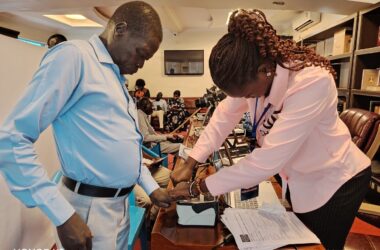By Alan Clement
Severe funding shortfall is threatening to extricate humanitarian efforts and place millions of South Sudanese at risk of losing life-saving assistance.
The World Food Programme (WFP) estimate that over seven million South Sudanese are on the brink of hunger, with 83,000 already facing dangerously low levels of food security in its latest report.
The frightening figures released in WFP’s latest operational update on South Sudan that followed a visit by WFP’s Deputy Executive Director and Chief Operating Officer, Carl Skau, paint a grim picture in a country already grappling with conflict, floods and growing influx of returnees fleeing the war in Sudan.
“The scale of the humanitarian needs in South Sudan is staggering. But the scale of suffering here does not make headlines,” said Carl Skau, who visited the country last week. “Millions of mothers, fathers, and children spend each day fighting hunger to survive,” he added.
According to WFP’s report, the humanitarian situation especially in Upper Nile State ravaged by conflict since March is catastrophic with thousands displaced with limited access to humanitarian assistance.
The report estimates over 30,000 people already face catastrophic hunger and counties like Nasir and Ulang potentially descending into famine.
The continuous influx of nearly 1.2 million people fleeing the war in Sudan further exacerbate the current situation with many returnees arriving with signs of trauma while others arrived hungry and in need of urgent humanitarian support. The report also highlighted that a record 2.3 million children across the country are at risk of malnutrition.
As communities continue to grapple with these challenges, some vulnerable communities especially in Jonglei State’s Uror county received much needed assistance to tackle the severe hunger residents faced.
An improvement in the security situation in other counties in the State enabled crop production hence improving food security. Food security was further bolstered by airdrops conducted in an effort to deliver essential food items to remote areas where access by land is not possible. These initiatives led to the delivery of over 430 metric tons of food intended to feed up to 40,000 people.
The airdrops were further supplemented by the resumption of vital River convoys along the White Nile carrying over 1,300 metric tons of food and other essential supplies. However, WFP warned that its assistance will scale down if donor support is not readily available.
Just a little over 2 million people representing about 30 percent of the most vulnerable people can be supported by WFP which urgently needs at least US$274 million to sustain it assistance through the end of the year potentially delivering only 50 percent rations to the vulnerable population.
“WFP has the expertise, the teams, and the capacity to deliver, even in the most remote and challenging environments. But without sufficient funding, and a period of peace, our hands are tied,” Skau emphasized.
He urged the international community to act swiftly, noting that failing to support South Sudan now, risks ruining recent progress made eventually plunging more communities into crisis.




